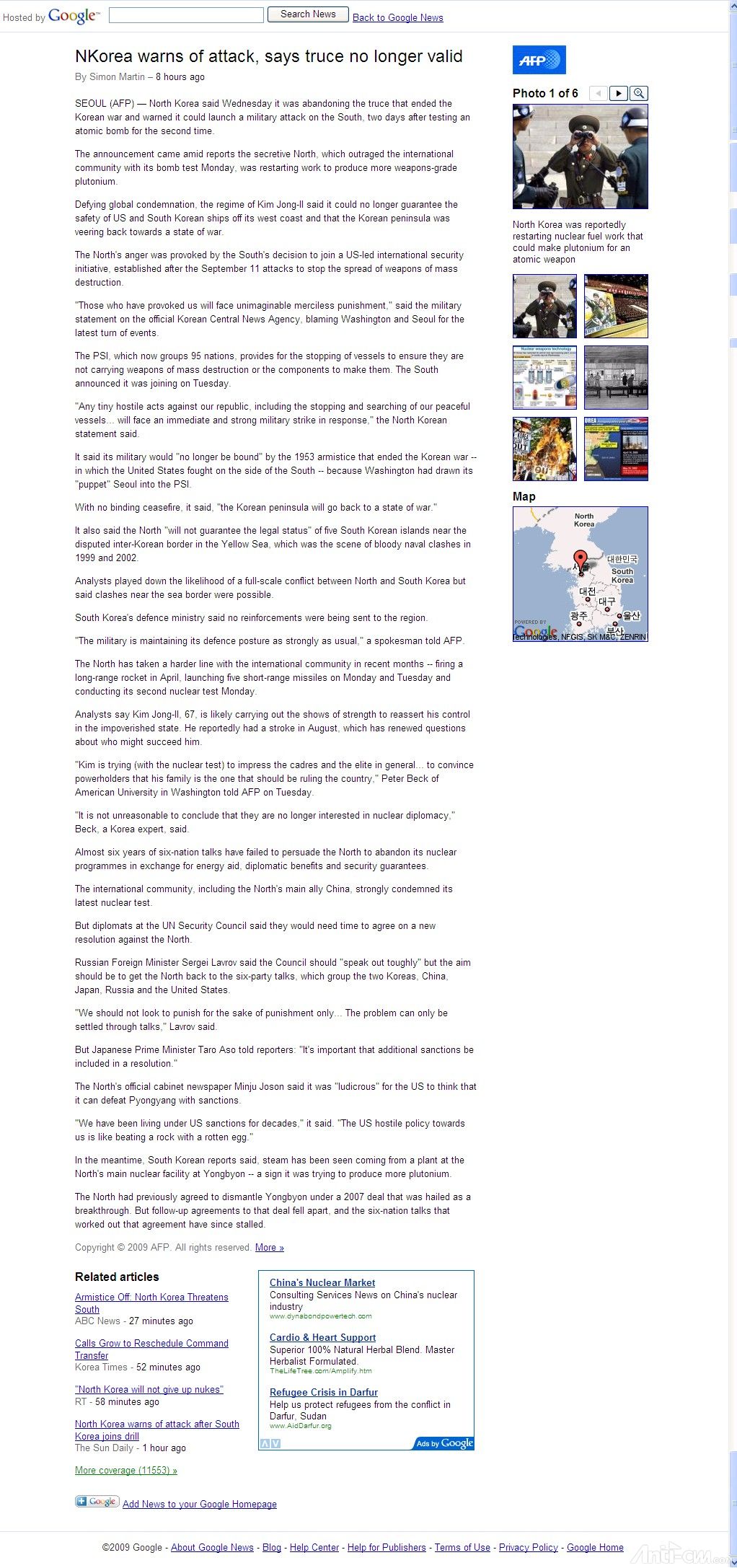|
|

楼主 |
发表于 2009-5-27 20:48
|
显示全部楼层
SEOUL (AFP) — North Korea said Wednesday it was abandoning the truce that ended the Korean war and warned it could launch a military attack on the South, two days after testing an atomic bomb for the second time.
The announcement came amid reports the secretive North, which outraged the international community with its bomb test Monday, was restarting work to produce more weapons-grade plutonium.
Defying global condemnation, the regime of Kim Jong-Il said it could no longer guarantee the safety of US and South Korean ships off its west coast and that the Korean peninsula was veering back towards a state of war.
The North's anger was provoked by the South's decision to join a US-led international security initiative, established after the September 11 attacks to stop the spread of weapons of mass destruction.
"Those who have provoked us will face unimaginable merciless punishment," said the military statement on the official Korean Central News Agency, blaming Washington and Seoul for the latest turn of events.
The PSI, which now groups 95 nations, provides for the stopping of vessels to ensure they are not carrying weapons of mass destruction or the components to make them. The South announced it was joining on Tuesday.
"Any tiny hostile acts against our republic, including the stopping and searching of our peaceful vessels... will face an immediate and strong military strike in response," the North Korean statement said.
It said its military would "no longer be bound" by the 1953 armistice that ended the Korean war -- in which the United States fought on the side of the South -- because Washington had drawn its "puppet" Seoul into the PSI.
With no binding ceasefire, it said, "the Korean peninsula will go back to a state of war."
It also said the North "will not guarantee the legal status" of five South Korean islands near the disputed inter-Korean border in the Yellow Sea, which was the scene of bloody naval clashes in 1999 and 2002.
Analysts played down the likelihood of a full-scale conflict between North and South Korea but said clashes near the sea border were possible.
South Korea's defence ministry said no reinforcements were being sent to the region.
"The military is maintaining its defence posture as strongly as usual," a spokesman told AFP.
The North has taken a harder line with the international community in recent months -- firing a long-range rocket in April, launching five short-range missiles on Monday and Tuesday and conducting its second nuclear test Monday.
Analysts say Kim Jong-Il, 67, is likely carrying out the shows of strength to reassert his control in the impoverished state. He reportedly had a stroke in August, which has renewed questions about who might succeed him.
"Kim is trying (with the nuclear test) to impress the cadres and the elite in general... to convince powerholders that his family is the one that should be ruling the country," Peter Beck of American University in Washington told AFP on Tuesday.
"It is not unreasonable to conclude that they are no longer interested in nuclear diplomacy," Beck, a Korea expert, said.
Almost six years of six-nation talks have failed to persuade the North to abandon its nuclear programmes in exchange for energy aid, diplomatic benefits and security guarantees.
The international community, including the North's main ally China, strongly condemned its latest nuclear test.
But diplomats at the UN Security Council said they would need time to agree on a new resolution against the North.
Russian Foreign Minister Sergei Lavrov said the Council should "speak out toughly" but the aim should be to get the North back to the six-party talks, which group the two Koreas, China, Japan, Russia and the United States.
"We should not look to punish for the sake of punishment only... The problem can only be settled through talks," Lavrov said.
But Japanese Prime Minister Taro Aso told reporters: "It's important that additional sanctions be included in a resolution."
The North's official cabinet newspaper Minju Joson said it was "ludicrous" for the US to think that it can defeat Pyongyang with sanctions.
"We have been living under US sanctions for decades," it said. "The US hostile policy towards us is like beating a rock with a rotten egg."
In the meantime, South Korean reports said, steam has been seen coming from a plant at the North's main nuclear facility at Yongbyon -- a sign it was trying to produce more plutonium.
The North had previously agreed to dismantle Yongbyon under a 2007 deal that was hailed as a breakthrough. But follow-up agreements to that deal fell apart, and the six-nation talks that worked out that agreement have since stalled.

|
|